During Aoki’s confession to Yui, didn’t you just wish a body swap would occur right there and then? It’s the perfect opportunity to mess with the story, like throwing a wrench into a machine. Alas, it never happened.
All is not lost, of course. There’s a very interesting follow-up scene — for me, anyway. Inaba-as-Iori finds Taichi alone in the club room. She decides to just ask him straight up: “What do you think of Iori?” As the scene unfolded, however, I found myself asking, “Wait a minute, how can you be so sure that Iori and Inaba really have switched bodies? What if Iori is just putting on an act?” These are the moments where Kokoro Connect flashes its potential: the ability to play with our perceptions and preconceptions. After five episodes, do we think we know these characters well enough? Hell, Taichi’s one of the girls’ closest friends, and yet, can he tell the difference when the chips are on the line?
Taichi soon finds his foot in his mouth when Inaba enters the scene, revealing that Iori had been herself all along. In the end, it’s not just Taichi’s lame response: “I don’t want to mess up what we have now” — though seriously, I can’t believe he would say that sort of non-committal shit. You either like a person enough to date them, or you don’t. Don’t play mind games. But anyway, that Taichi would have been so easily fooled is sort of insulting, isn’t it? He never once questioned Iori’s identity. Does it justify Iori’s reaction though? Is she right to call out Taichi for his “lies?”
Taichi: “Because no matter what happens, no matter how much you change, I’ll always be able to recognize you for who you are.”
I suppose Iori’s young and emotionally fragile, and as a result, she took Taichi’s words at face value. I’m having a hard time believing that this shows without a doubt that Taichi had lied. Like I had asked above, can Taichi tell the difference when the chips are on the line? Should the chips have been on the line in this case though? I don’t know, but I don’t really think so. I’m inclined to think Iori overreacted.
In the middle of a tense moment, however, I don’t understand the anime’s need to take a short detour, so to speak, to talk to Fujishima: “Must we live in a world where a couple is defined as a man and a woman?” Yeah, uh, who gives a shit right about now? Ain’t nothing wrong with gay rights, but there’s a time and a place for that. It’s these moments that draw me out of the viewing experience. It definitely feels as though you could’ve just excised this entire scene.
But let’s get back to Iori’s problem. She claims that she can’t even decide which club to join because she’s constantly changing the role she plays. Taichi argues that this is no different from someone who merely likes a lot of clubs. Who’s right? This reminds me of an advice I had just repeated in a comment earlier today: “If you’re a shy person, just pretend as though you have confidence. At some point, you’ll realize that you had it all along.” What is the qualitative difference? What’s specious about this argument anyway? Does it matter if it’s sophistry if it gets the job done?
At one point, Iori comments that she admires Taichi for his stability. No matter what personality she chooses to put forth at any given moment, Taichi will always be the same friend to her. This got me thinking about anime archetypes. Aren’t the male leads in every anime usually the same? Are they usually similar to a character like Taichi? But does the main female love interest change roles as often as Iori’s character might suggest? Sometimes, you get a tsunderekko. Other times, you might get the girl-next-door type. After decades and decades of anime, however, we’ve run the entire gamut. We don’t feel as though heroines really change all that much. And on the flip side, is there really anything comforting about the male leads being so stable? Isn’t stability just another word for really-fucking-boring?
And just when Iori praises Taichi for his “stability,” he goes and confesses his love for her. He’s likely too boring to be fucking with her, but whatever happened to not wanting to mess up what they already have? Is this a big change on Taichi’s part? Did he not just do something different just because Iori made everyone think she was about to do something drastic?
Before we can really address the subtleties of Taichi’s character, which is actually sort of remarkable in a way, the Heartseed assumes control of Iori’s body and tosses it off the bridge the two friends were standing on. A love confession that would’ve changed the dynamics of the series is temporarily put on arrested development. Instead, we raise another issue that, while interesting at first glance, isn’t all that troubling when you really think about it.
To contextualize everything, Iori’s body is going to die as a result of her “suicide.” The Heartseed tells her four friends that one of them can nevertheless choose to swap places with Iori and thus save her soul, so to speak. Naturally, Taichi volunteers immediately. When confronted by Inaba, he reveals that he can’t bear to see others in pain. In other words, he’s selfless for his own sake. He claims to only do good deeds to make himself feel good. Is he then ultimately selfish?
Like I’ve said, this does seem like an interesting twist on the bland male leads plaguing nearly every anime series. Are these do-no-wrong, morally upright protagonists actually insane at some core level? But this is just like the confidence thing I had mentioned earlier in this post. Whether or not you do good deeds for the sake of the morally right, does it really matter all that much? Kant would say no, but he’s also an old fogey bastard. If I could get every multi-billion dollar corporation in the world right now to donate just ten percent of their proceeds to charity, who cares if these corporations aren’t acting out of the noblest gesture?
On a deeper level, we run into this cynical assumption of human motives because we conflate “satisfying our own desires” with “acting selfishly.” Just because I feel better as a result of helping you, it doesn’t follow that I am acting selfishly. It’s just a side effect that I ultimately find pleasurable. The second problem is thinking that this pleasurable side effect from doing good deeds is what I’ve been after all along. Let’s just use the anime’s example.
Taichi has just been informed that Iori’s personality will die with her body if no one switches bodies with her. He also gets this horrible feeling and he wants to get rid of it. He realizes that he can get rid of this horrible feeling if he switches bodies with Iori. As a result, his good deed is truly selfish. Swapping bodies with Iori was simply a means to an end, which was to make himself feel better. But is this what’s truly happening?
Taichi: “I don’t want to see anyone else suffer! It hurts me more than I can imagine when I think about the pain they must feel! I can’t stand it! I’d rather suffer in their place! Right, I’m not doing this for anyone else. I’m a selfish freak for my own good.”
The problem here is that Taichi’s wrong. Yes, he helps others and it makes him feel better, but the only reason he feels bad in the first place is because others are in pain. He can identify how to help others because, ultimately, his aim is to help others. Taichi have simply made a common mistake: what we hope to accomplish is not the same as the pleasure we get as a result of accomplishing what we originally set out to do. Taichi doesn’t like to see his friends suffer. He thus solves their problems and feels good as a result. This is not being selfish. Rather, it’s just being a good person. A selfish person, on the other hand, feels bad, then guesses at what he or she must do to get rid of that feeling. This is a far cry from what Taichi is trying to do. As much as I like to dump on bland male leads like Taichi, he’s not a selfish person.
The bottom line is this: can you think of a single altruistic act that doesn’t carry with it some form of self-pleasure? It’s difficult, isn’t it? Therefore, the focus should be on the causal relation between us and the good deeds we perform. The first thing out of Taichi’s mouth is “I don’t want to see anyone else suffer.” This sounds to me as though his self-pleasure is secondary to the primary concern: the suffering of others.
I find it strange how Iori ended up in Inaba’s body before responding to Taichi’s confession of love at the hospital. Did they feel as though it would’ve been too weird for her to remain in Aoki’s body? Too gay, even?
In the end, Iori wasn’t going to die; the Heartseed was just screwing with everyone. Why? Rather, do we need the conceit of the Heartseed’s prank to make this scenario even plausible? Can we imagine the same story without the Heartseed? We would thus have an emotionally fragile girl who tries to commit suicide because she likely couldn’t handle Taichi’s confession of love — what if he isn’t true to his word? Do anime series need a sci-fi/fantasy twist to make serious stories more palatable? Is it necessary to force people to swap bodies in order for them to confess their true feelings? This last question is what particularly interests me. When watching other shows (e.g. Sakamichi no Apollon), viewers have complained that no one communicates. As a result, misunderstanding ensues and we thus have drama. Is Kokoro Connect tweaking this same convention just a bit? I don’t know yet.
On an unrelated note, I enjoyed this episode.

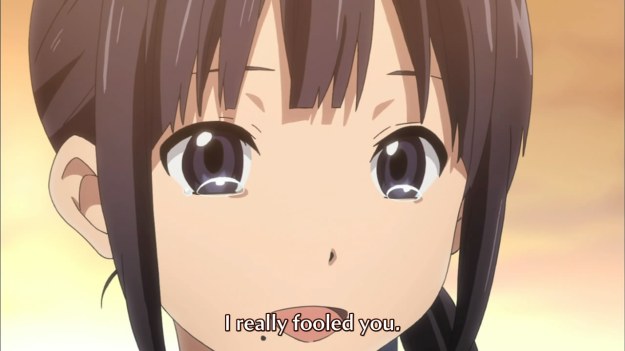
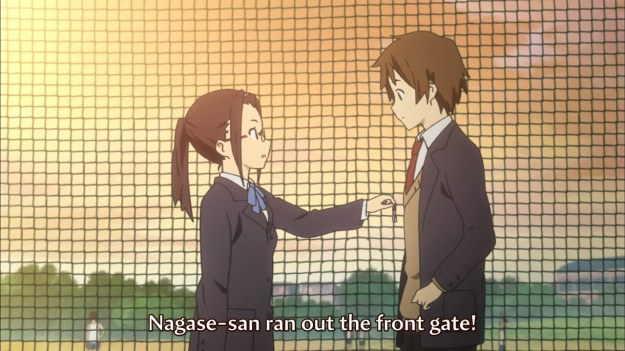
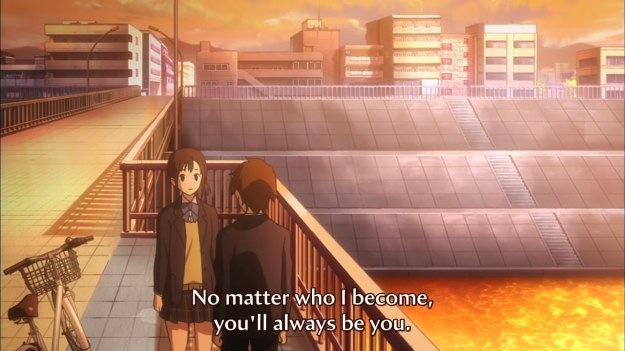
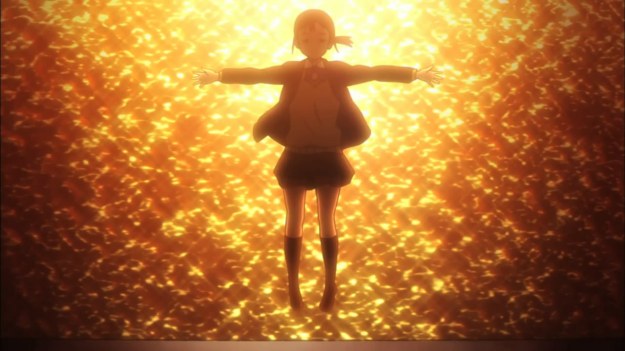
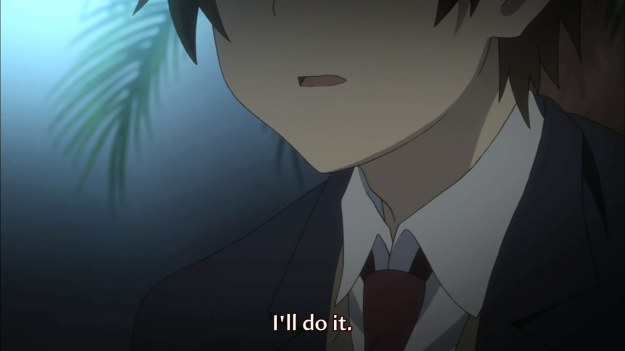
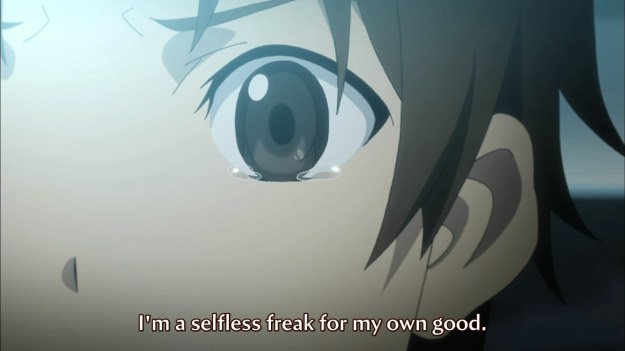
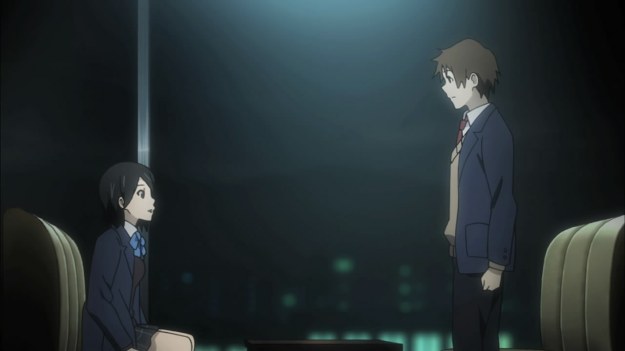
>I find it strange how Iori ended up in Inaba’s body before responding to Taichi’s confession of love at the hospital. Did they feel as though it would’ve been too weird for her to remain in Aoki’s body? Too gay, even?
I think it’s not far-fetched to say that Iori wanted to talk to Taichi last, and it would’ve been weird to switch back into Aoki to do that.
For the record the talks go:
– Iori and Aoki swap; Iori and Yui swap (implied)
– With Aoki through Yui
– With Inaba through Yui
– Iori and Yui swap; Iori and Inaba swap (implied)
– With Yui through Inaba
– With Taichi through Inaba
My point is that there can be more than one determining cause.
Also I just realized that each of the VAs for the 5 MCs had 5 roles each for this show. Actually Iori’s had 6 if you count as different from .
Iori is a fascinating, mutli-faceted character, I’d think. Inaba and Yui are relatively straight forward (though that doesn’t make them any less compelling), but Iori has many layers, many masks, many, many depths.
One thing Kokoro Connect failed to touch on with Iori was : why do we wear masks ? To get along with people? To avoid trouble? Ultimately, I think it’s a little wasted that Kokoro Connect didn’t go as deep into Iori’s character as we have in Taichi – to go beyond merely symptoms and reasons, to motivations behind these reasons. The causes behind the causes, if you will.
On Taichi’s case, I think I hesitate on branding him as a bland male lead. It’s as overused as Generic Harem Protagonists, and a short hand suggesting that all Bland Male leads are the same. Really? Makoto for example was a Bland Male Lead, yet a very different breed of character from a Taichi or for that matter, a Shirou Emiya.
But, I agree you have to give credit to Kokoro Connect for digging deep into the driving motivation behind the bland “male” lead psyche. I think Taichi’s case goes beyond the mere pleasure derived from Altruism. The other set of the equation is the aversion of pain – for whatever reason, Taichi seems to posses an immense amount of Empathy – the capability to feel the pain of others.
Of course, to be fair, this is one episode, struggling to adapt it’s message into a 20 minute deadline. I think for 20 minutes, Kokoro Connect has done a very good job in Episode 5. This, I’d say, is one of Kokoro Connect’s strongest episode yet.
So, where to next? Would Kokoro Connect focus on identity? Perhaps Kokoro Connect would deconstruct, in greater detail, the concept of Social Masks (do our closest friends accept us even without our masks?)
The thing is, I think the first Five Episodes of Kokoro Connect should be viewed as one whole story, rather than treating each episode as a separate story of it’s own. I’m going to bring in the LN angle here (yes, I apologize in advance). Kokoro Connect’s first five episodes (this is from what I get various Anime forums) forms one Volume worth of story. In other words, the entire Five Episodes has been all about the same story, the same cohesive narrative, that the adaptation broke up into five parts. Sometimes, I think an Episodic approach to critiquing shows such as this may be a little flawed, for none of these episodes are self-contained stories, but a series of scenes spread over five episodes that form one entire story.
Perhaps your positive regard for this episode might be a result of the story of the past four episodes all culminating in the Fifth Episode.
One thing is for certain- Kokoro Connect shows a depth of character exploration rare in most stories, and that is enough to make it a distinctive show of it’s own.
The better question is to ask whether or not we even wear masks? Or is she just fretting over nothing. We all adapt our personalities to fit the situation. How is she any different? I’m polite around my mother. I’m cheerful with my fiancee. I try to be cool with my bros. What makes her exceptional?
You named two other harem leads in a genre that has seen hundreds.
Nice try, but I don’t see how Yui and Inaba’s stories were absolutely necessary for this episode’s characterization. That Taichi is helpful? This could’ve been shown in a multitude of ways that wouldn’t have made the previous four episodes disappointing. My complaint about the previous episode was that they didn’t actually flesh out Inaba’s problem. How does this episode affect that criticism? In fact, had you removed Yui and Aoki from the episode, I don’t think I would’ve missed them. You said it yourself that we could have focused more on Iori. That could’ve been done by cutting out the other two girls’ stories. I stand by my critiques of the previous episodes.
Disagree. The adaptation should account for the fact that the episodic nature of an anime series will break a story up into parts. As a result, the people doing the adaptation should’ve tried harder to work around this limitation of the medium..
“Disagree. The adaptation should account for the fact that the episodic nature of an anime series will break a story up into parts. As a result, the people doing the adaptation should’ve tried harder to work around this limitation of the medium..”
The story is made for viewers, not for reviewers. It properly works around the limitations of the medium to present an enjoyable story, even if you are watching it from week to week, but that doesn’t mean that they will all provide a self-contained conclusion that can be properly analyzed in several paragraphs on their own.
The 3rd and 4th episode brought up some issues, and the 5th answered them. That’s not a fault, unless you are an episodic blogger who feels pressed to say some clever conclusion about “the message” of every individual episode.
Yui’s androphobia was resolved too easily. How did the fifth episode answer it? Inaba’s trust issues were one dimensional. How did the fifth episode answer it?
There is no difference. I am a viewer. I can also be a reviewer. This distinction is meaningless.
I never mentioned a self-contained conclusion. The previous comment did. I merely argued that an episode should always be enjoyable to watch, not simply a means to an end, i.e. a future episode.
I’ve always viewed anime in an arc basis. This is the main reason why I even started to watch anime, to begin with. So, I always look at shows by the Arc, not by the Episode. Unless the adapters are going to butcher the medium, or cross into anime original territory, it is nigh impossible in my view to break down a Movie Length arc into five “self-contained” Episodes.
On a slightly tangential note, after looking through what Muv Luv was all about, I’ve started subjecting protagonists to the Muv Luv test – throw any so called “generic harem protagonist” into that world, and how would he fare, and how long would he survive?
That being said, I do agree with the sentiments posted elsewhere that Kokoro Connect and Tari Tari ironically develops and fleshes out their Female characters far more than their male characters.
Don’t misrepresent my argument. Each episode should be compelling on its own, not just subservient to some “concluding” episode. I did not find the fourth episode compelling. That in itself is a flaw. The fifth episode being enjoyable does not change that. If you view anime by the arc so much, you have yet to convince me how Inaba’s one-note problem and Yui’s easily-resolved phobia were necessary for the fifth episode to be any good. They are all, as you say, part of one arc. What, then, did they contribute to our satisfying conclusion?
Let’s take your argument even further. In fighting shounens, where an arc can encompass a ton of episodes, you will undoubtedly get some really boring ones. I should know. I watched plenty of DBZ as a little kid. There were some fucking boring episodes before Goku went SSJ. Are we not allowed to criticize those boring episodes just because the arc had a satisfying conclusion? Look, I get that you really enjoy Kokoro Connect, but you’re being ridiculous.
“Do anime series need a sci-fi/fantasy twist to make serious stories more palatable? Is it necessary to force people to swap bodies in order for them to confess their true feelings?”
to the first question i’d say: it doesn’t require them per se, but the studios seem to think they can’t make a decent story without a scifi twist, no matter how stupid it may be. which sort of links to the second question. no, it’s not necessary obviously. but i think the whole point of sci fi is to explore the same basic emotions, motives (the psyche in general even) in conditions and circumstances that are impossible right now in RL. that’s what makes it interesting – what IF we could swap bodies? how will ppl behave THEN? so imho you’re asking the wrong question (2nd one).
The questions were meant to be food for thought. The readers can draw their own conclusions.
Enjoyed the post very much. I can’t help but wonder what this show would be like were it not set in a high-school, but I’m enjoying it quite a bit at the moment. I agree with what you said about the whole becoming the mask thing. Also, agreed Taichi’s motives don’t really matter. One might not call it altruistic, but that seems like a pointless distinction anyway. Not sure I entirely agree about whether that qualifies as selfish. I guess it depends on how much emphasis you put on motives. As a fairly humble/modest person, calling it selfishness is quite probably just an easy out to being talked up.
Re that argument we were having on the UN-GO post, I’m pretty sure I get where you’re coming from. Nonetheless, I disagree, but I really don’t have the time and energy at the moment to give you the responses your replies deserve, so if you don’t mind let’s consider that argument dropped, though you probably already had.
This was never a philosophy blog to begin with so I’m fine with moving on from that discussion.
I love the messages this show puts forth, but the fact that it just moves from event to event without anything in-between, hurts it a little. From one drama to another.
I would’ve loved if they fleshed it all out, maybe even not follow the light novels properly.
I agree with you that the show does hop from one girl to the next. Yet I keep getting these readers who proclaim how all five episodes thus far have fit together like some sort of brilliant jigsaw puzzle. Iori’s problem is really the only problem to span multiple episodes, which equated to what? Two?
People are crazy. As I know what kind of way the story will go (only the plot in overall, not details), I wonder how you will feel about it.
Well, that’s why we watch anime, right? But goddamn, KC lovers are defensive.
“It’s the perfect opportunity to mess with the story, like throwing a wrench into a machine. ”
E Minor, you are a worse person than Heartseed.
I am the Heartseed!
A few points:
1. I disagree with you on Iori’s reaction to her successfully fooling Taichi. Taichi made a promise that there’s no way he could have known for certain if he’d be able to keep it or not. It’s like a pro sports player seeing “We *will* win tonight’s game”. If you make bold promises like that, expect to be held to account for them. And that’s all Iori did – She tested Taichi to see if he could make good on his promise to her. And she found that he couldn’t, meaning that his promise was empty bravado all along, which is naturally upsetting to her. Sure, it was well-intentioned bravado (meant to reassure Iori), but Iori probably feels like it meant that Taichi was taking her issues too lightly. But it’s not that Taichi was taking her issues to lightly, per se. It’s that…
2. Taichi likes keeping the stakes low. That’s why he tries to simplify and play down situations and personal issues as much as possible. That’s why the way he tries to address each of the girl’s issues is very quick and simple, without necessarily requiring much follow-up. It’s also why he was initially hesitant to move beyond friendship with Iori (and may go back to such hesitancy next episode). Taichi is a generally good guy, I think, but his tendency to downplay and simplify does undermine him sometimes.
3. Taichi and Aoki are both heterosexual (or, at the very least, there’s no reason to think that they’re not). It only makes sense that the five friends would prefer Iori’s confession response to Taichi to be delivered in a way that respects that. Much like what you yourself wrote earlier on in this blog review, there’s a time and place to be concerned with issues like gay rights, but responding to a romantic confession made between two heterosexuals is not the time for that. Why make the situation more awkward than it needs to be by having the confession response come from Aoki’s form to Taichi? Look, there’s nothing wrong with a straight guy feeling awkward over the form of his closest male friend approaching him romantically. That’s not homophobic in and of itself, it’s just human.
4. I do think it’s possible to overthink altruism. If you dislike seeing others in pain, that says something in and of itself. That alone is at least somewhat altruistic. So I think we’re on the same page here.
On the whole, I enjoyed this episode too.
1. Don’t you think it just felt a little cheap? A casual conversation in a club room amongst friends is what I mean by the chips not being on the line. Give Taichi a real test, not this high school “do you like me, do you not like me” nonsense that kids play. I mean, it’s like if you promised your wife to clean the house, so she tests you by dropping a scrap of paper. She can rib you for not picking the scrap of paper up right away, but c’mon, that can’t be a real test. I’d be pretty shocked if my wife ran out of the house because of it. But let’s be clear: Iori could’ve run because she simply felt as though Taichi had rejected her. If she ran, however, because she thinks he lied, I just think she’s being unfair.
2. I suppose you could see Taichi’s behavior as downplaying things. But I can’t really say as though he’s downplayed anything with Inaba and Iori. If anything, they both seem to “upplay” their problems — Iori, especially. My complaint with Inaba was that her trust issues never went beyond “Well, I don’t trust my friends.” So there wasn’t really anything serious to address. Iori’s “I wear multiple masks” problem? Sorry girl, but we all do it. You’re not as special as you think. The only person whose problem shouldn’t have been brushed aside so easily was Yui, but then she seems no worse for wear.
3. I didn’t call it homophobic. It was an observation. I found it amusing that Aoki was the first to volunteer his body to Iori, so that they would eventually work through the bodyswapping and end up with Inaba as the final person to talk to Taichi. These things are all calculated. So amusingly enough, I think you may be reading a tad much into my single paragraph on the “issue.” Then again, perhaps I should have used a different word than “strange.” Nevertheless, I was ribbing the anime as I am wont to do.
“Kant would say no, but he’s also an old fogey bastard.”
High-five! Kant’s a total ass-hole!
(Y)